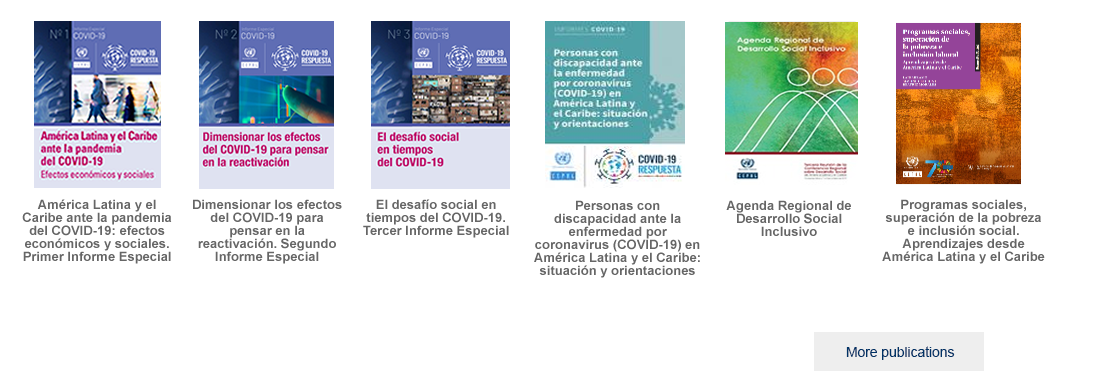Lista de reuniones:
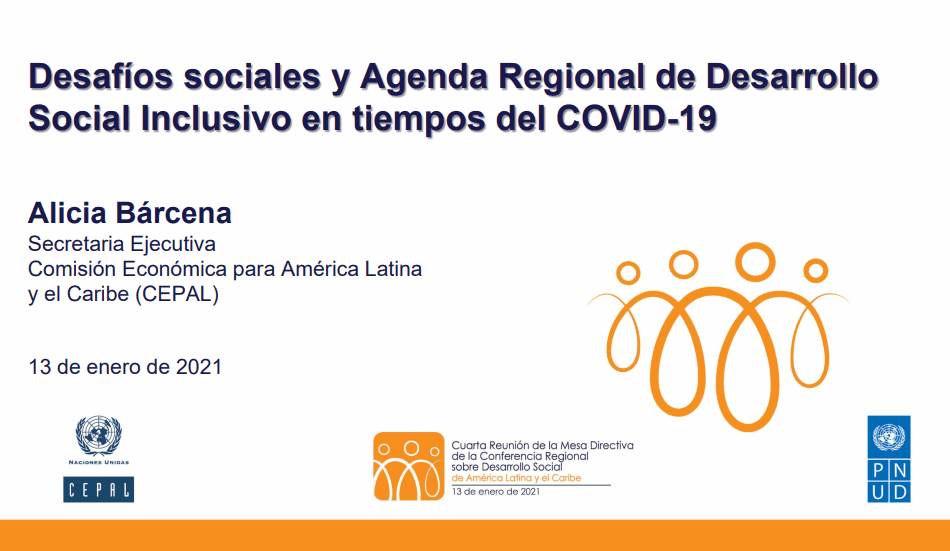
Date: 13-01-2021 | Place: Virtual
Description:
The Fourth Meeting of the Presiding Officers of the Regional Conference on Social Development of Latin America and the Caribbean was held virtually on January 13, 2021, in the framework of the XII Ministerial Forum for Development in Latin America and the Caribbean. This meeting brought together Social Development ministers and senior authorities from Latin America and the Caribbean and addressed the social situation of the region in the context of the COVID-19 pandemic.
Related documents:
Participant Institutions:
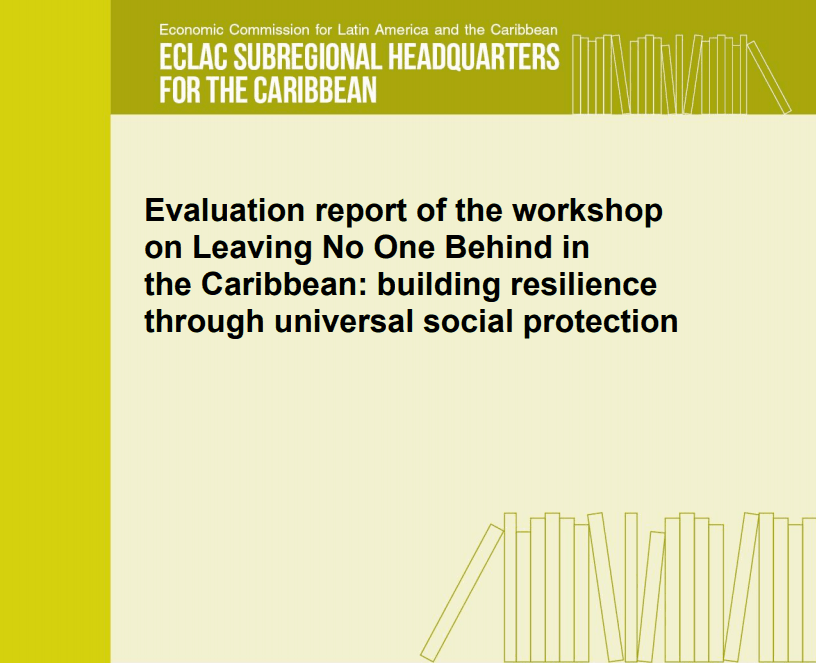
Date: 06 al 07-10-2020 | Place: Virtual
Description:
The Workshop aims to strengthen the capacity of policymakers in the Caribbean in designing and implementing universal social protection systems and programmes, as well as enhance the competency of the technical staff of member States to measure inequality and identify the furthest behind as a necessary first step in reducing inequalities through social protection. The workshop will also contribute to advance the promise of Agenda 2030 to “leave no one behind” and support the attainment of specific Sustainable Development Goals (SDGs).
Related documents:
Participant Institutions:
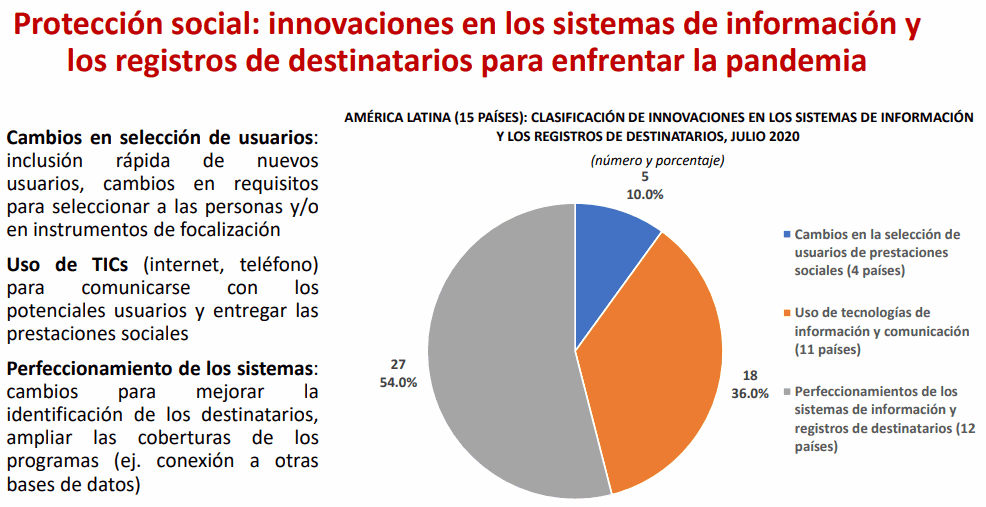
Date: 03-12-2020 | Place: Virtual
Description:
The Workshop " Sistemas de información social y registros sociales en América Latina: avances y desafíos frente al COVID-19", was held virtually on December 3, 2020. The main objectives of the workshop were to address the advances, learnings and challenges of social information systems and participant registries in the region based on the results of a study that systematizes their pre-COVID-19 situation and the main innovations adopted in 15 Latin American countries to implement social protection measures against the emergency.
Related documents:
Participant Institutions:
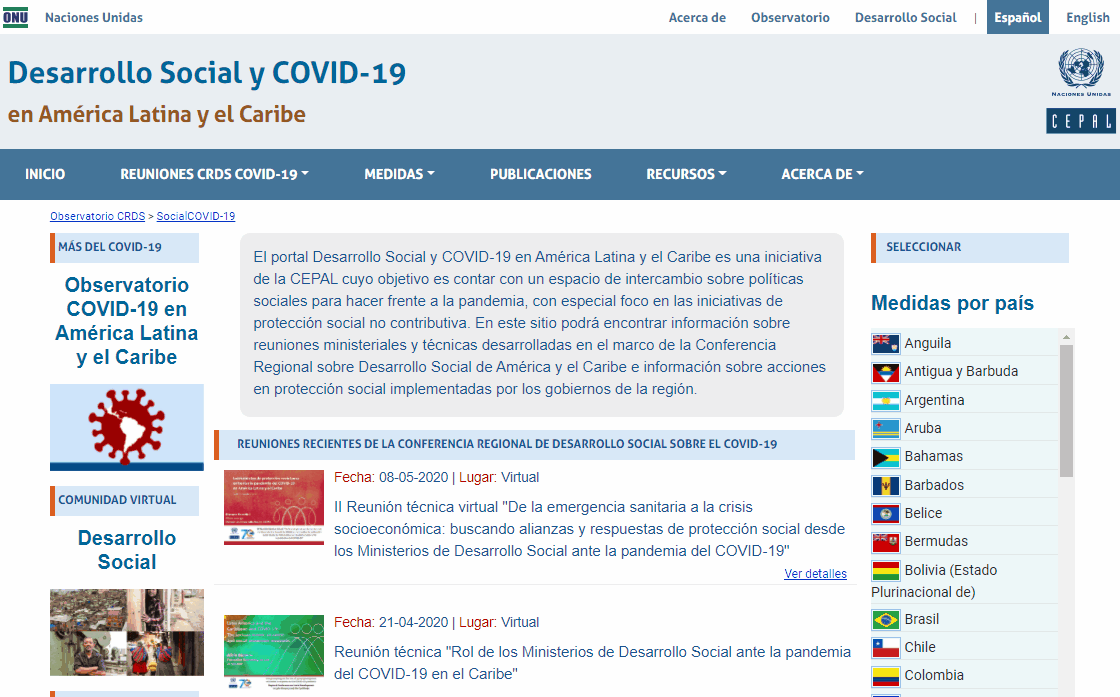
Date: 31-08-2020 | Place: Virtual
Description:
Related documents:
Participant Institutions:
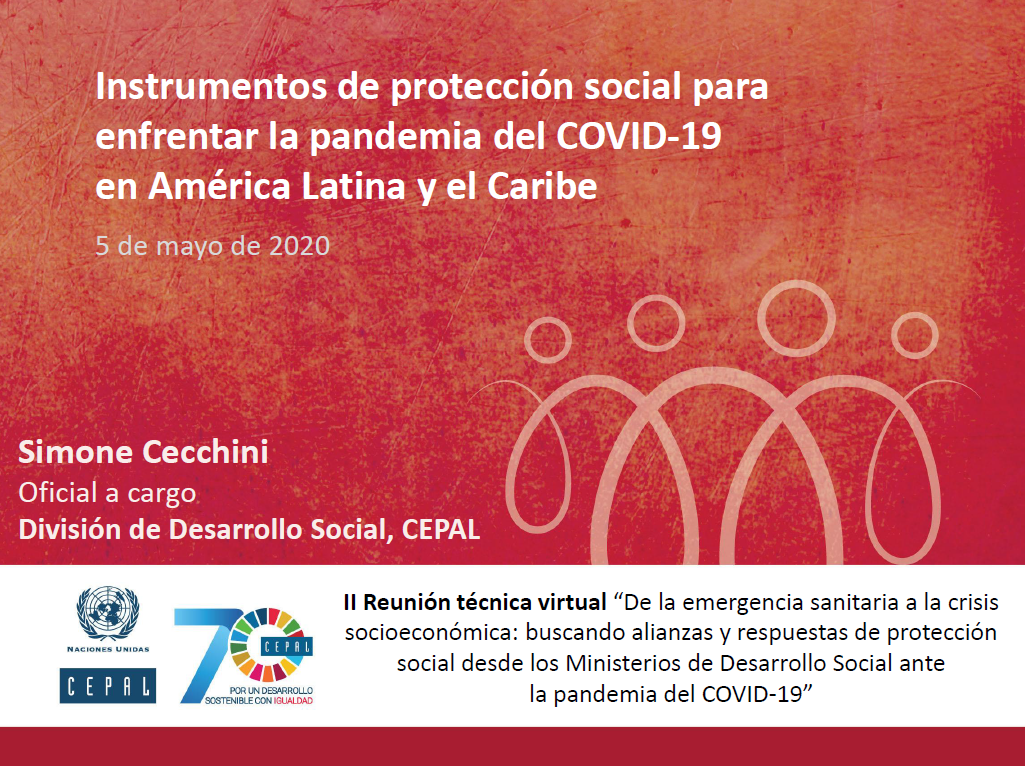
Date: 08-05-2020 | Place: Virtual
Description:
This meeting involved not only member countries, but also UN agencies and other international cooperation agencies. The latter shared input on the work they do along governments, and they discussed their outlook about the main challenges either caused or deepened by COVID-19. In turn, member countries discussed their position in regard to transitioning from quarantine to an exit plan, and in relation to restrictions on the free movement of people, all of this in a context of economic and social crisis. All of this, with the purpose of sharing their most urgent needs, as well as informing of those measures that were successfully implemented and that could be replicated in other countries.
Related documents:
Participant Institutions:
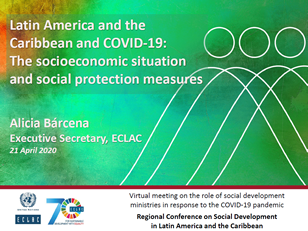
Date: 21-04-2020 | Place: Virtual
Description:
The goal of this meeting was to discuss challenges and vulnerabilities faced by Caribbean countries during the COVID-19 pandemic, as well as to identify their needs in regards to technical assistance. Most countries have implemented response packages, including measures such as emergency financial assistance for income support, food vouchers, creation of helplines, and moratorium on payments of utilities, among others. Some of these measures have been directed mainly to vulnerable groups, many of which had not been previously included in official registries. As a result, the importance of having updated databases was stressed as a key priority, as well as improving medical and health facilities, applying modern technologies for the disbursement of payments, and establishing effective institutional frameworks to facilitate planning and actions across sectors and at all levels, in order to be better prepared for future emergencies. ECLAC insisted in the importance of regional coordination and cooperation to tackle this crisis, taking into account the Regional Agenda for Inclusive Social Development (RAISD) agreed by the member countries during the Conference in Mexico City in 2019.
Related documents:
Participant Institutions:
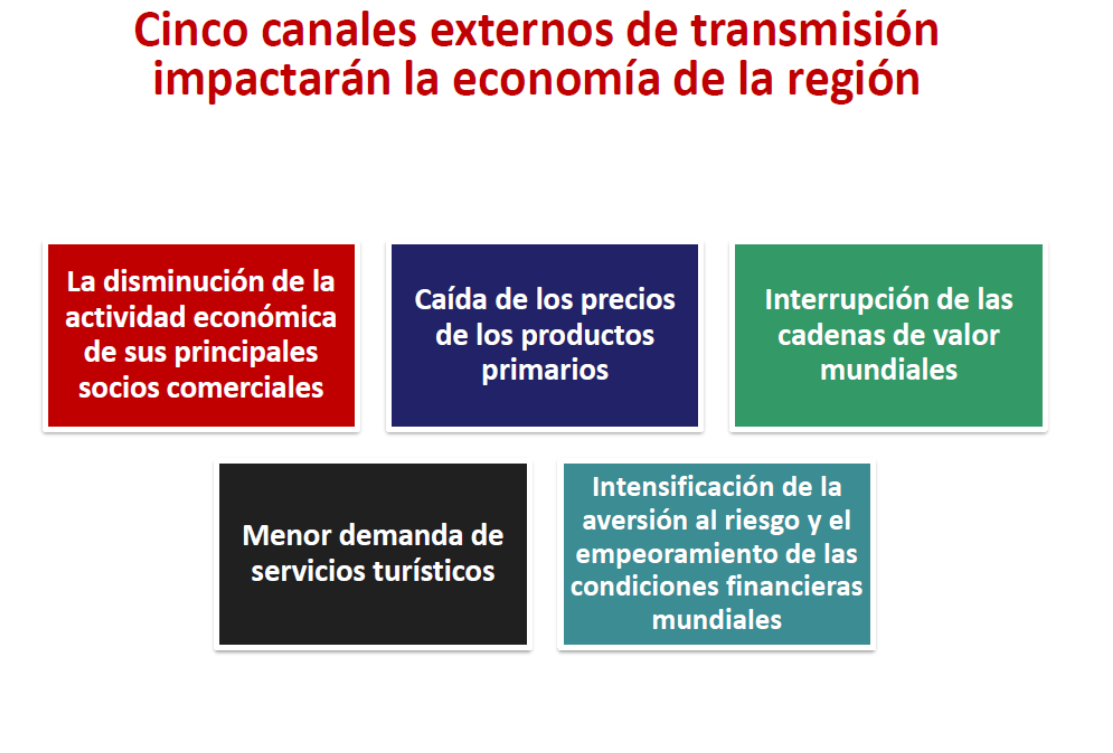
Date: 08-04-2020 | Place: Virtual
Description:
The focus of this meeting revolved around the challenge of ensuring that measures and programmes designed to tackle the pandemic reach the people that they intend to help, and also about the need for technical assistance between countries. Among the main difficulties faced were keeping complete registries of the target populations of each programme, the pressure over social services, the need to work on a long term framework in order to deal with the economic effects to come, and the development of strategies to speed up the delivery of resources, among others. Also, several countries voiced the importance of learning from each others experiences, especially in relation to population registries, so they can incorporate vulnerable and hard-to-reach groups (elderly, migrants, indigenous peoples, women, etc) to the benefits of social protection. Finally, ECLAC informed that it will be enabling instances of interaction to promote the exchange of experiences among member countries, such as the Observatory on COVID-19.
Related documents:
Participant Institutions:
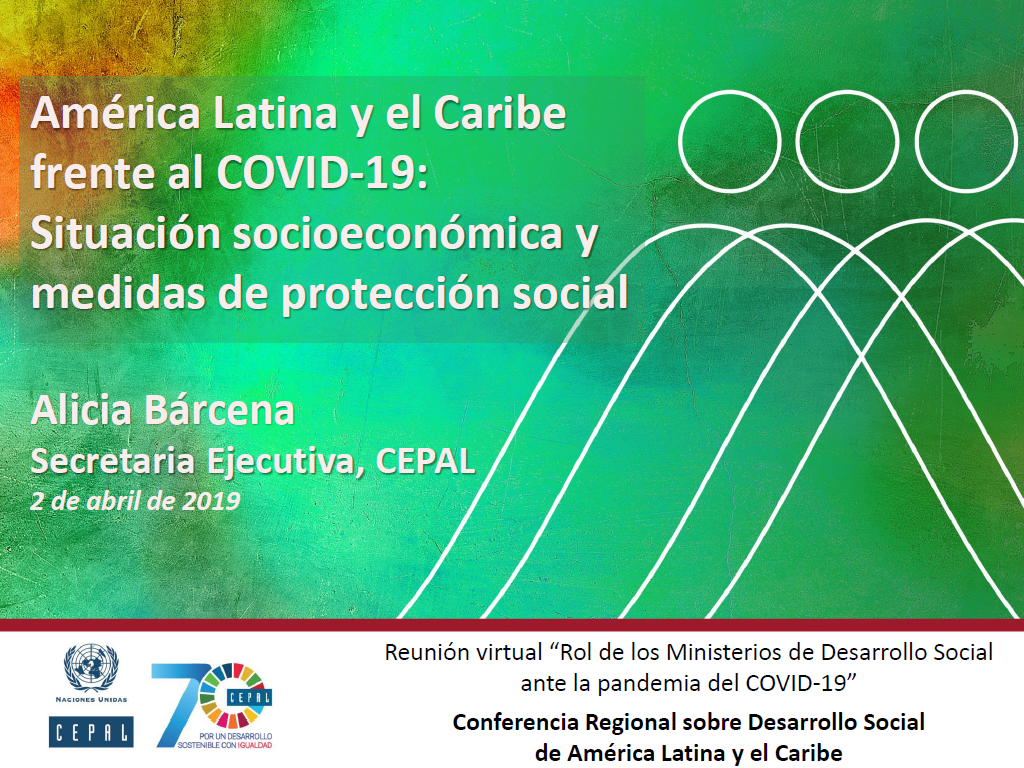
Date: 02-04-2020 | Place: Virtual
Description:
This meeting had the goal of sharing experiences about the role of Ministries of Social Development and other similar entities in facing the current crisis caused by COVID-19. It was especially interesting to know how each institution has responded to the pandemic in three specific aspects: i) main socio-economic problems and priorities in social protection; ii) difficulties, challenges and lessons in their responses to the crisis; and iii) cooperation needs. It was noticed that the main focus of the regions ministries has been to mitigate the loss of human lives, as well as to avoid an expansion of poverty and extreme poverty. For this purpose, they have taken joint action along other ministries (economy, health, education, etc) and actors (universities, professional associations, private sector, among others). Later, Alicia Bárcena, Executive Secretary of ECLAC, called for an implementation of universal, redistributive and solidarity policies to avoid another lost decade in regards to improvements in social protection.
Related documents:
Participant Institutions:
